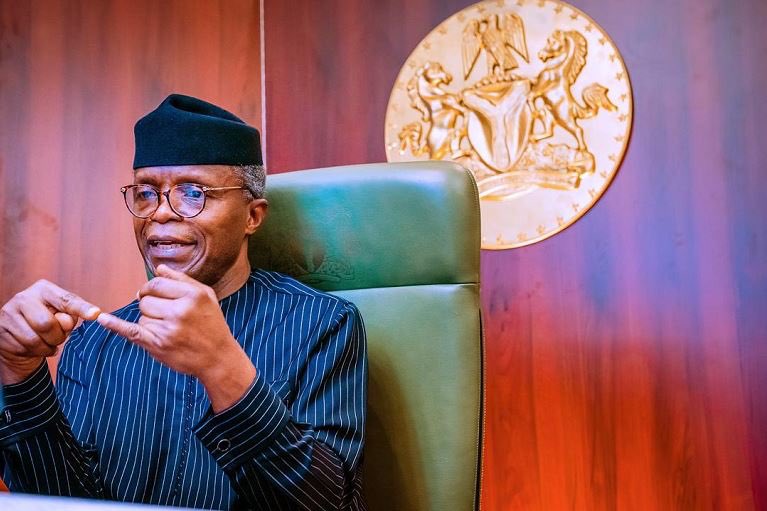Cryptocurrencies Should Be Regulated Not Banned – Vice President Osinbajo
 Vice President, Yemi Osinbajo, has called for the regulation of cryptocurrency in Nigeria, as against the exclusion of the digital currency from the financial ecosystem in the country.
Vice President, Yemi Osinbajo, has called for the regulation of cryptocurrency in Nigeria, as against the exclusion of the digital currency from the financial ecosystem in the country.
He said this at the one-day special summit of the Bankers Committee organised by the Vanguard Newspaper on Friday at Eko Hotels and Suites, Lagos state.
Osinbajo who was the special guest at the event spoke on a number of issues affecting the economy of the country, including cryptocurrency.
He said;
On the very topical issue of blockchain technology, digital assets, and cryptocurrencies, let me say two things.
First is that there is no question that blockchain technology generally and cryptocurrencies, in particular, will in the coming years challenge traditional banking, including reserve banking, in ways that we cannot yet imagine so we need to be prepared for that seismic shift and it may come sooner than later.
Read Also: Outcry Greets CBN’s Order Directing Banks To Close Accounts Related To Cryptocurrencies
Osinbajo expressed;
Already, remittance systems are being challenged. Blockchain technology will provide far cheaper options for the kind of fees being paid today for cross-border transfers.
I am sure you are all aware of the challenge that the traditional SWIFT system is facing from new systems like Ripple, which is based on the blockchain distributed ledger technology with its own crypto tokens. There are, of course, a whole range of digital assets spawned daily from blockchain technology.
He stressed;
Decentralised finance, using smart contracts to create financial instruments, in place of central financial intermediaries such as banks or brokerages is set to challenge traditional finance. The likes of Nexo finance offer instant loans using cryptocurrency as collateral.
Some reserve banks are investigating issuing their own digital currencies. Clearly the future of money and finance, especially for traditional banking, must be as exciting as it is frightening. But as we have seen in many other sectors, disruption makes room for efficiency and progress.
He further said;
I fully appreciate the strong position of the CBN, SEC, and some of the anti-corruption agencies on the possible abuses of cryptocurrencies and their other well-articulated concerns, but I believe that their position should be the subject of further reflection.
There is a role for regulation here. And it is in the place of both our monetary authorities and SEC to provide a robust regulatory regime that addresses these serious concerns without killing the goose that might lay the golden eggs. So, it should be thoughtful and knowledge-based regulation, not prohibition.
The point I am making is that some of the exciting developments we see call for prudence and care in adopting them, but we must act with knowledge and not fear.
Central Bank of Nigeria (CBN) recently banned cryptocurrency transactions in Nigeria’s financial ecosystem.
Read Also: Godwin Emefiele Under Fire For Describing Cryptocurrency As Money Created Out Of ‘Thin Air’ (Video)
Governor of CBN, Godwin Emefiele, while appearing before a joint Senate Committee on Banking, Insurance and Other Financial Institutions; ICT and Cybercrime on Tuesday, stated that the Crypto ban was in the best interest of Nigerians.
The head of the nation’s apex bank also attributed the cryptocurrency financial system to a dark world or shady undertone, which cannot be monitored by financial regulators.
He said;
Cryptocurrency is used to describe the activities of the players in an electronic dark world, where transactions are extremely opaque, they are black and not white. They are not visible and they are not transparent.
In another parlance, there are people who deal in transactions that not only want a trail but indeed by its nature cannot be trailed. I’m sure that these definitions alone are scary enough to create anxiety for any regulator or central bank in any part of the world.
And that’s is the reason, virtually all regulators in the world do not recognize it. Since many Nigerians deft into its usage, we have been studying the development.
